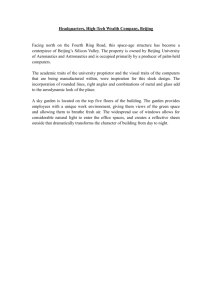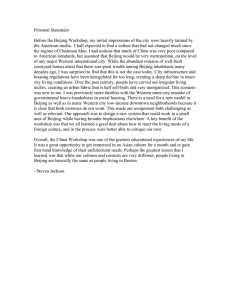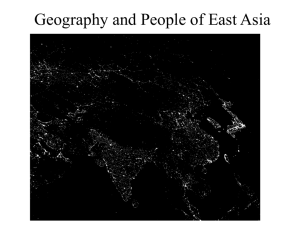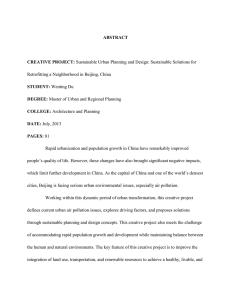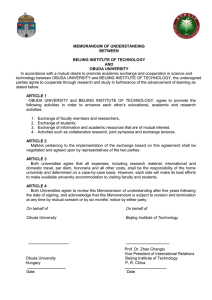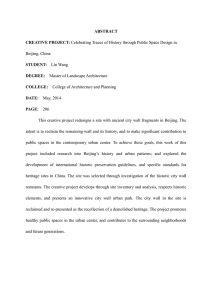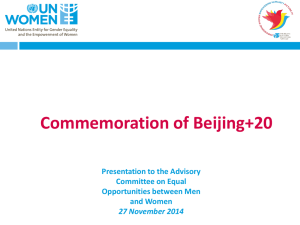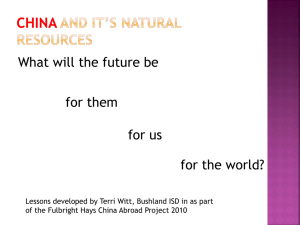ITU ASP CoE Training on Spectrum Monitoring Practical Information for Participants
advertisement
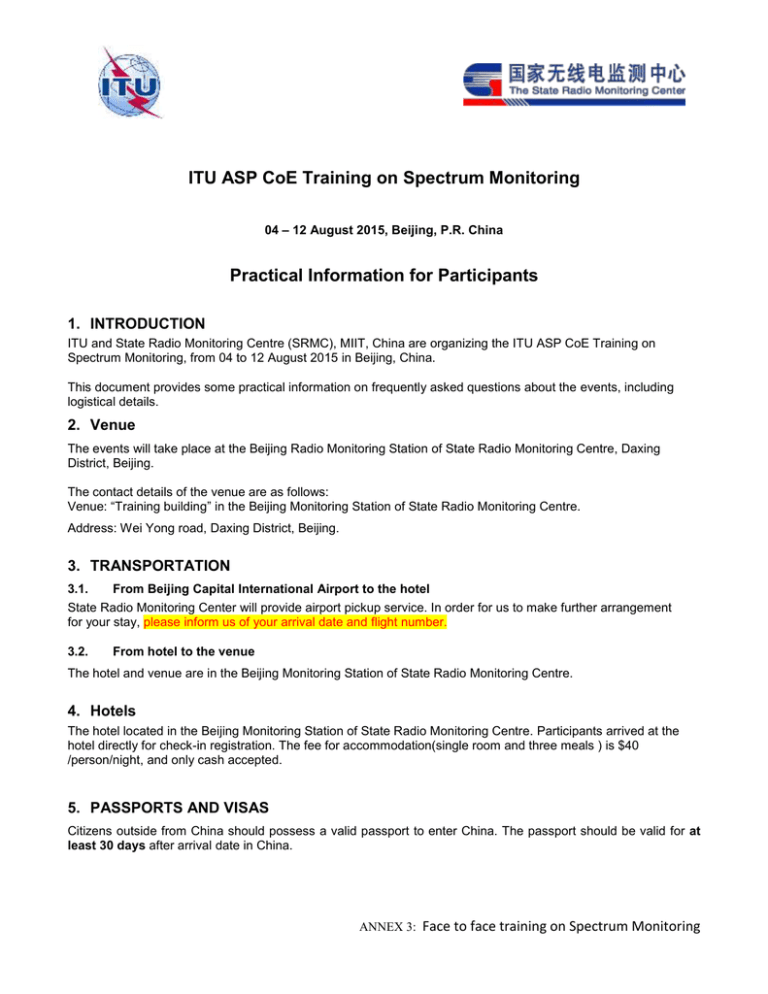
ITU ASP CoE Training on Spectrum Monitoring 04 – 12 August 2015, Beijing, P.R. China Practical Information for Participants 1. INTRODUCTION ITU and State Radio Monitoring Centre (SRMC), MIIT, China are organizing the ITU ASP CoE Training on Spectrum Monitoring, from 04 to 12 August 2015 in Beijing, China. This document provides some practical information on frequently asked questions about the events, including logistical details. 2. Venue The events will take place at the Beijing Radio Monitoring Station of State Radio Monitoring Centre, Daxing District, Beijing. The contact details of the venue are as follows: Venue: “Training building” in the Beijing Monitoring Station of State Radio Monitoring Centre. Address: Wei Yong road, Daxing District, Beijing. 3. TRANSPORTATION 3.1. From Beijing Capital International Airport to the hotel State Radio Monitoring Center will provide airport pickup service. In order for us to make further arrangement for your stay, please inform us of your arrival date and flight number. 3.2. From hotel to the venue The hotel and venue are in the Beijing Monitoring Station of State Radio Monitoring Centre. 4. Hotels The hotel located in the Beijing Monitoring Station of State Radio Monitoring Centre. Participants arrived at the hotel directly for check-in registration. The fee for accommodation(single room and three meals ) is $40 /person/night, and only cash accepted. 5. PASSPORTS AND VISAS Citizens outside from China should possess a valid passport to enter China. The passport should be valid for at least 30 days after arrival date in China. ANNEX 3: Face to face training on Spectrum Monitoring Citizens of some countries are required to obtain a visa in order to enter and spend any time in China. The visa must be requested and obtained from the Chinese Embassy/consulate in your country, or if there is no such office in your country, from the one that is closest to the country of departure. In order to get the invitation letter for the VISA, please forward the registration confirmation email and send the copy of your passport to Ms. Yu Yali(yuyali@srrc.org.cn) with copy to Mr. Christiono Andreas (andreas.christiono@itu.int) before 3rd of June 2015 the latest. 6. ABOUT CHINA The People's Republic of China is a socialism country with its own characteristics. China is a developing country and lies in the east of Asia. It is border by Russia and Mongolia to the north and North Korea to the northeast. To the south are Vietnam, Laos, Thailand and the Philippine. To the west and southwest are India, Burma, Bhutan, Nepal and Pakistan. To the east is Japan, which faces China across the East China Sea. China is a vast territory of over 9,600,000 square kilometers. It has a population of more than 1.3 billion, which is a quarter of the world population. It consists of 34 provinces, autonomous regions, and municipalities directly under the Central Government. Beijing, which is situated in the Northeast of China, is the capital. China is characterized by a continental climate. The latitude spans nearly 50 degrees. The greater part of the Chinese territory is situated in the Temperate Zone, its southern part in the tropical and subtropical zones, and its northern part near the Frigid Zone. Temperatures differ therefore rather strikingly across the country. The northern part of Heilongjiang Province has long winters but no summers; while the Hainan Island has long summers but no winters. The People's Republic of China was founded on October 1, 1949. Today, China is implementing reform and opening-up policies, and has established socialist market economy, thereby charting the course for socialist modernization with Chinese characteristics. Language and Character Chinese is commonly used in modern China. It is one of the five working languages designated by the United Nations and, as a written language; Chinese has been used for 6,000 years. 6.1. About Beijing Beijing is not only the nation's political centre, but also its cultural, scientific and educational heart and a key transportation hub. Beijing has served as a capital for more than 800 years. The city had many places of historic interest and scenic beauty, including the imperial Palace (also known as the Forbidden City), the largest and bestpreserved ancient architectural complex in the world; the Temple of Heaven, where Ming and Qing emperors performed solemn rituals for bountiful harvests; the Summer Palace, the emperors' magnificent garden retreat; the Ming tombs, the stately and majestic mausoleums of 13 Ming Dynasty emperors; and the world-renowned and genuinely inspiring Badaling section of the Great Wall. Large-scale construction since the founding of the People's Republic of China in 1949 has brought great changes to Beijing. Today's Beijing still retains the alluring fascination of an ancient capital, but has added a small forest of skyscrapers and a complete range of municipal facilities, transforming itself into an attractively modern metropolis redolent of history. 6.1.1. Transportation Public Transportation in Beijing consists of: subway, buses and taxi. To call for a taxi with in Beijing: 0086 10 96106, 0086 10 68733399. ANNEX 3: Face to face training on Spectrum Monitoring 6.1.2. Health Care Pharmacy and good medical facilities are largely available in Beijing. Emergency medical services: 120 6.1.3. Useful Emergency Numbers Police: 110 Fire Brigade: 119 7. LANGUAGE Chinese is the official language in China, but English is widely understood in major hotels, restaurants, banks and businesses. The training will be held in English. 8. CURRENCY AND BANKING The official currency accepted in China is RMB. There are six kinds of bills(100yuan,50yuan,20yuan,10yuan,5yuan,1yuan)and three kinds of coins(1yuan,50cents,10cents)used. Major foreign currencies may be exchanged to RMB at hotels and banks. Official banking hours can vary slightly, but in general are from 9:00 a.m. to 12:00 a.m., and in the afternoon 13:30 to 16:00. Banks are generally closed on weekends and holidays. The current exchange rate is approximately 6.19RMB to 1 US Dollar as of April 2015. Cash can be easily withdrawn 24/7 from the numerous ATMs spread in the city. 9. CREDIT CARDS Major credit cards (American Express, Diners Club, MasterCard, VISA and UnionPay card) are accepted by most hotels, restaurants, car rental agencies, department stores, but no small local shops. . Usually there is a sticker at the entrance indicating which cards are accepted. 10. CLIMATE The climate of Beijing is mainly temperate.In the spring, it's warm and wind; in the summer it's especially hot; in the autumn, it’s sunny and cool; in the winter, it's dry and cold. In all, its climate is typical in the north。 August temperature in Beijing: Average high (C/F):35/95 Average low (C/F): 22/71.6 The suitable for wearing shirts, T-Shirts, skirts. 11. LOCAL TIME The local time is UTC/GMT +8hours. 12. Tipping Tipping is not customary in China. 13. TAXES Usually the displayed prices have sales tax included in China. 14. ELECTRICAL APPLIANCES The standard power supply in China is 220 volts, the frequency is 50Hz. The type of power outlet/connector used in China is a two parallel outlet hole or three-hole outlet triangle. For the convenience of participants to use, we will provide wiring board, which is porous outlet. ANNEX 3: Face to face training on Spectrum Monitoring two parallel outlet hole three-hole outlet triangle wiring board 15. CALLING CODE AND INTERNET TLD China calling code is 0086 and Beijing 0086 10. 16. DRIVING Cars in China have their steering wheel on the left. Cars drive on the right. For additional information, please contact the following local coordinators: Ms. Yu Yali (yuyali@srrc.org.cn) Mr. Christiono Andreas (andreas.christiono@itu.int) Have a nice trip to Beijing! ANNEX 3: Face to face training on Spectrum Monitoring
